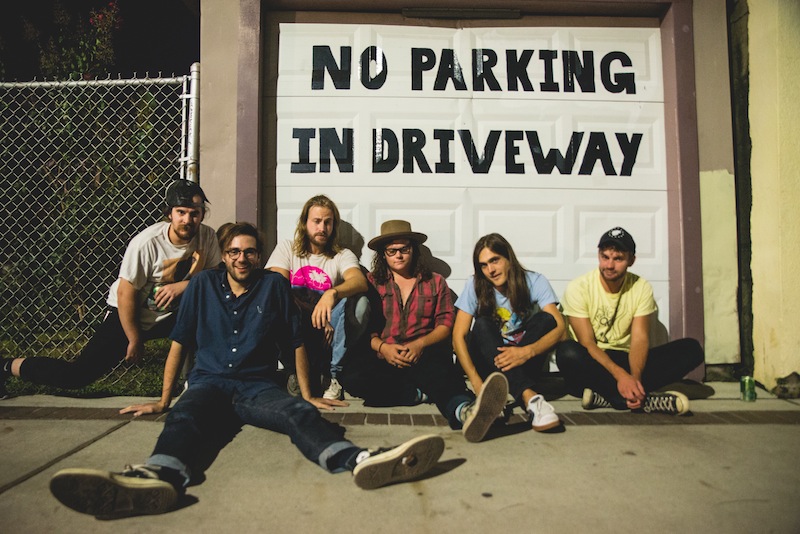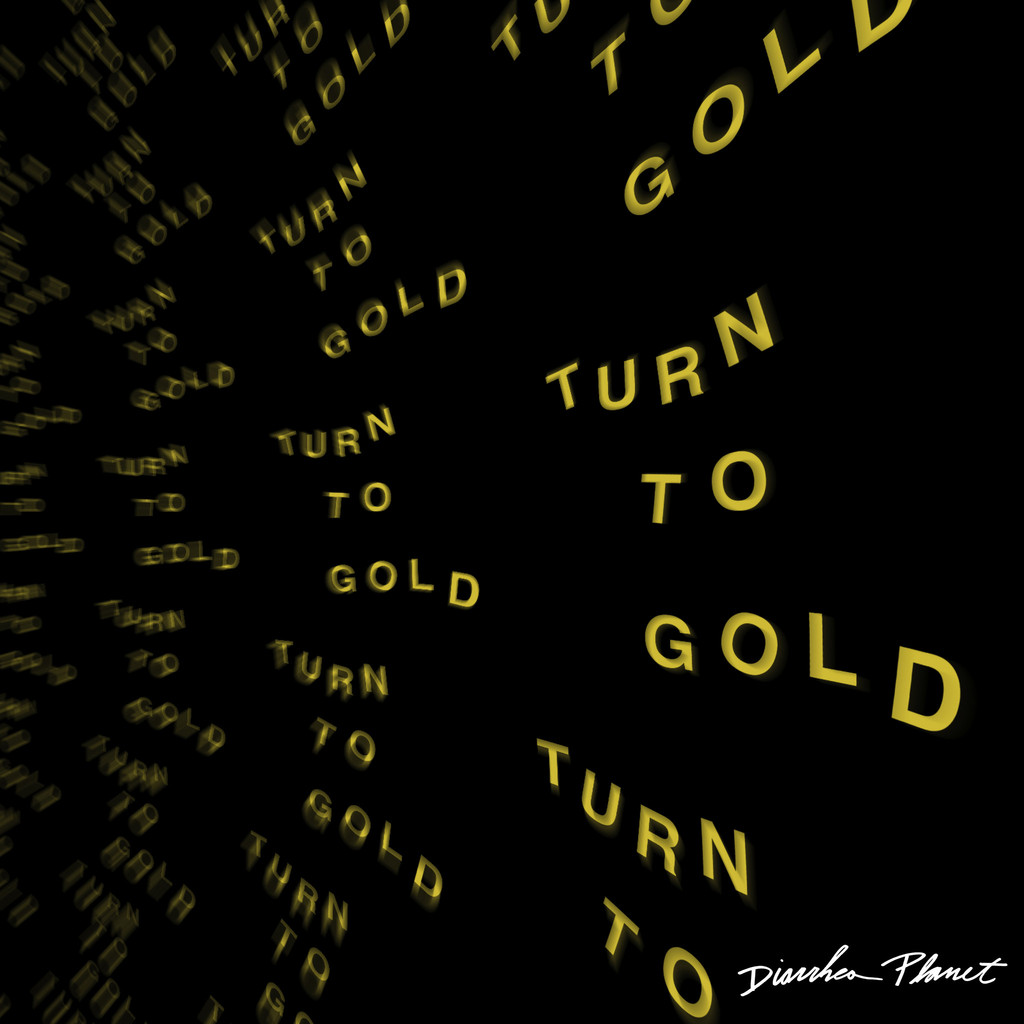Impossible to Ignore: A conversation with Diarrhea Planet

Despite enjoying greater exposure than ever before and a steadily swelling fanbase, Diarrhea Planet haven’t lost any of the pure rock fury that highlighted early releases such as Aloha and Loose Jewels. (Attend one of their shows if you have any doubts.) What they have done is found a way to streamline that relentless, quad-guitar-driven energy into their newest album, Turn to Gold (out June 10 from Infinity Cat Recordings)—by far the band’s most cohesive, hook-laden and resonant work to date.
Treble chatted with guitarist/vocalist Emmett Miller about the Turn to Gold songwriting and recording process, how Diarrhea Planet aims to create universally appealing music without compromise, the responsibility of representing the Nashville scene, the exuberance of costume-wearing fans and more.
Treble: You say this album comes closest to the sound of your live show, but it’s also very put-together and cohesive. Was it a challenge to accomplish both of those things simultaneously?
Emmett Miller: I think [the album] came together easily. At the crux of the operation was Vance Powell’s production and Mike Fahey’s work as assistant engineer. As far as the sound and feel of the record, Vance was instrumental in getting us set up and feeling comfortable in the room together to capture that live sound. Vance saw us live 3 or 4 times at SXSW 2015 and knew what we sounded like, and was the best candidate to capture that feeling. On the songwriting end, this was the first time we wrote all the songs in one go, with the exception of the intro (“Hard Style 2”) and “Let it Out.” But this was the first time we’d taken time off the road to work [solely] on a new record, and I think the coherence comes from that. It took two months to write the songs, and then it went from demos to rough mixes in just a few more months. For everything else, like I’m Rich (Beyond Your Wildest Dreams) and Loose Jewels, we’d record all these demos over the course of two years or so and just make a record from those.
Treble: Because this album is hook-driven enough to get mainstream radio play—especially tracks such as “Life Pass” or “Bob Dylan’s Grandma”—did you ever worry about having to make compromises to your sound or did it simply come out exactly as you wanted it to?
EM: It came out exactly as we wanted it to, I think. We wanted to play the kind of music that resonates with us the most, and that’s this larger-than-life rock with pop hooks. Our dream is to make a record so big that it’ll be impossible to ignore us—in part because of our band name. (Laughs)
Treble: To me this sounds like the most hopeful and exultant—if not exactly happy or positive—Diarrhea Planet work to date. Did anything in particular inform that?
EM: I don’t think there was a conscious effort on our part to go for that (mood), but I definitely know what you mean. I think if anything it comes from us being at different points in our lives than I’m Rich, which had a quiet desperation to it. Now we’re in a place where we’re able to quit our shitty jobs that we had while making that record, and can do the band full time. We have more stability in our lives, aren’t as hungry as we once were…(laughs) maybe selling out a little bit…I also think that honing our sound—it was a bit scrappier before, whereas now we’ve grown into our playing styles and everyone’s fallen into a pocket —allowed us to articulate our ideas more clearly. But I think we’ve always been a celebratory rock band, especially in our live show, getting people together to have a visceral experience. That’s what we’re all about.
Treble: It’s remarkable for your band to have the four-guitar sound without ever sounding sloppy. Even when all of you are just wailing on your strings it sounds deliberate but wild and never stiff. Was that hard to capture on record for Turn to Gold?
EM: There are two sides to it. There’s the hyper-orchestrated stuff where everyone has a specific written-out part, like “Hard Style,” with four-part harmony and detailed notation, no improvisation. On the other hand, there’s something like the outro to “Dune,” where everyone is improvising. Two completely different feelings, but one aspect where we’ve matured is knowing exactly what we’re doing. Before some people might have specific parts and others might be playing whatever, but now we plan out who’s improvising and when, or if no one is. (Improvisation) is an explicit goal now, whereas before, that was just how recording turned out and we didn’t talk about it. We’ll still be more fast and loose with that stuff live. I like to joke that you get a totally different show depending on where you stand—like if you’re in front of the band, stage left or stage right.
Treble: You do covers with some regularity in your live show, the most recent example being “Thunderstruck” by AC/DC (featuring Harry Kagan of Music Band on lead vocals) . How much planning goes into choosing the songs you want to cover?
EM: We try to start with tunes that everyone will know, like “I Believe in a Thing Called Love” (by The Darkness) or “Born to Run.” “Thunderstruck” got a lot of mileage from us, because we played it on our east and west coast tours with Music Band. While we don’t have that wide of a repertoire, we do spend some time to pick one that we can play for a while during part of a tour. I think “Bohemian Rhapsody” would be hilarious, but it looks like someone…wait, which band was it that just filled in at Hangout Fest? Not Arcade Fire…but anyway, they just did “Bohemian Rhapsody” at Hangout. Totally beat us to it. (Note: It was Panic! At the Disco, apparently, who covered “Rhapsody” May 21 at Hangout Festival in Gulf Shores, Alabama.)
Treble: Do you feel any responsibility to be ambassadors of the Nashville DIY/punk scene and carry the torch now that you’re one of the most visible bands to emerge from it?
EM: Part of me thinks that there’s so much music coming out of Nashville right now that if it weren’t us, it’d be someone else. At the same time, I think that if this album were to flop, no one would point to (the) Nashville (scene) and be like, “Oh, see, they lost it.” I also feel guilty that, especially in the last year, we haven’t been more involved in the local scene because we’ve been touring nationally so much and when we’re home it sometimes feels more like vacation than being at home. I feel that we were enormously fortunate that we started when we did, coming up under JEFF the Brotherhood, and (late Nashville concert promoter/label head/scene hero) Ben Todd was especially instrumental in connecting us, JEFF, Heavy Cream, Natural Child, PUJOL and other local bands to the national circuit. It’s tough for some of the bands now because they don’t have the same infrastructure that we did coming up, and it might be our duty to take bands under our wing the way JEFF did for us. Maybe we could’ve done that with Music Band a little bit, but I think those guys might not need help for long. They’re so good. I’d like to be more involved with the scene in the coming year. It’s tough when you play 200 shows a year and you’re wiped and it’s like, “Oh, what are we gonna do tonight now that we’re home? We could go to a show…” But yeah, I feel like we do have that responsibility, and can maybe improve in that respect, and reach out to more bands.

Treble: When Diarrhea Planet was starting out, how did you guys manage promoting and getting yourself out there without that major-label infrastructure?
EM: We were very fortunate that we got a booking agent after our first few years. Jon Prine at (Progressive Global Agency) took us on and we’d tell him, “Get us 200 shows a year,” and he’d say, “OK, done. Here’s your route sheet.” A lot of bands don’t necessarily have that and have to directly promote themselves. We didn’t have to do as much of it ourselves as some bands. But early on, I think we benefited from the name quite a bit, much as we might groan and roll our eyes that every interview we got, in the first couple of years, would have the word “scatological” in the first paragraph. Nine times out of 10. Or it’d begin with something like, “Now, bear with us, the name is awful, but…” It definitely got us out there and worked to our advantage!
Treble: What’s the strangest fan interaction you’ve had with fans? If the crowd at the show I went to was any indication, they’re pretty devoted.
EM: A couple of buddies surprised us for one of our hometown shows at Exit Inn, I think it might’ve been during [Nashville festival] Freakin’ Weekend: Our now-drummer Ian Bush and Jordan’s roommate [Jordan Smith, DP guitarist-vocalist] Keegan showed up backstage, and as we went on they changed into full suits of armor, rushed onstage and dueled. That might be cheating, because they’re our friends…I love silly stuff like that because I feel it enhances the show for everyone. I feel like there are many different ways to go nuts at a DP show, and it’s a chance for people to let their freak flag fly a little bit, and I love when people spin that in a way that’s positive for everybody rather than as a way to get aggression out.
Oh man, I also gotta give a shoutout to the “D.C. Dog.” There’s this guy who comes to all our D.C. shows and at some point later in the show he’ll appear at the side stage in a hot dog costume and play tambourine till the end of the set. (The Dog) was once spotted at another show by Bob Boilen of NPR Music—he was on a date, actually, and Bob took him aside and said, “Hey, hate to bother you, but are you the D.C. Dog?” “Oh, no man, no, you got me confused with some other guy, I don’t know what you’re talking about.” It was so funny because this girl from D.C. hit us up on Twitter and asked, “Do you know the D.C. Dog? I would totally go on a date with him.” We said we didn’t but knew a guy who did, so that guy set them up and this was the date! So she asked (the Dog), “Did you plan this?” And he said, “No, I swear! I’ve never seen that guy, I don’t know who that is!”

